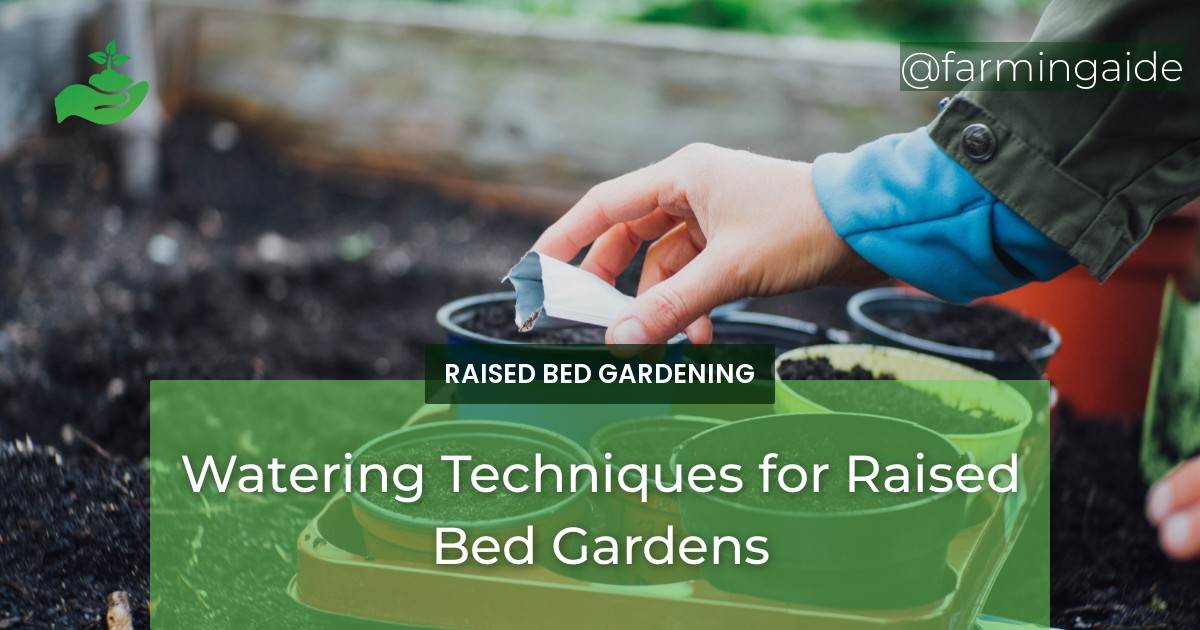Proper Watering Methods for Raised Beds
When it comes to raised bed gardening, proper watering techniques are essential to ensure a healthy and thriving garden. Here are four effective ways to water your raised bed garden:
Table of Contents
1. Hand Watering
Hand watering is the most basic and inexpensive method of watering your raised bed garden. With this method, you can easily control the flow of water and ensure that each plant receives adequate moisture. However, hand watering can be time-consuming, especially if you have a large garden.
2. Soaker Hoses
Soaker hoses are an excellent option for raised bed gardens as they allow for efficient and even watering. These hoses are designed to release water slowly directly to the roots of your plants. Soaker hoses also help conserve water by reducing evaporation, which can occur with other watering methods such as overhead sprinklers.
3. Drip Irrigation
Drip irrigation is a method of delivering water slowly and directly to the roots of your plants through a network of tubes and emitters. With this method, you can easily adjust the water flow and timing to meet the specific needs of your raised bed garden. Drip irrigation is a great way to conserve water while ensuring that your plants receive the right amount of moisture.
4. Automated Sprinkler Systems
An automated sprinkler system is a convenient way to water your raised bed garden without having to do it manually. You can set the system to water your plants at specific times of the day and control the duration and frequency of watering. However, automated sprinkler systems can be expensive, and they require proper installation and maintenance.
Water Conservation Tips
Water conservation is an essential aspect of raised bed gardening, and there are many ways to reduce water usage. Here are four tips to help you conserve water:
1. Mulching
Mulching is a great way to conserve water in your raised bed garden. Mulch helps to retain moisture in the soil by reducing evaporation and suppressing weed growth. You can use a variety of organic materials such as straw, leaves, or grass clippings as mulch in your garden.
2. Watering in the Morning
Watering your raised bed garden in the morning is an effective way to conserve water. Morning watering allows the soil to absorb water before the heat of the day causes evaporation. It also gives your plants time to dry out, which can help prevent disease and fungal growth.
3. Using a Rain Barrel
Using a rain barrel to collect rainwater is an excellent way to conserve water in your raised bed garden. Rainwater is free and contains essential nutrients that can benefit your plants. You can use the collected rainwater to water your garden during dry periods.
4. Companion Planting
Companion planting is a technique of planting complementary plants together to benefit each other. Some plants can help conserve water by providing shade and reducing evaporation. For example, you can plant taller plants like tomatoes or sunflowers to provide shade for smaller plants like lettuce or spinach.
ALSO READ
Irrigation Systems for Raised Bed Gardens
There are various irrigation systems available for raised bed gardens, and each has its advantages and disadvantages. Here are four common irrigation systems:
1. Gravity-Fed Irrigation System
A gravity-fed irrigation system is a low-cost option for watering your raised bed garden. With this system, you use gravity to move water from a higher elevation to a lower elevation. You can use a hose or a series of pipes to transport the water to your garden, and the water flows through small holes or emitters to deliver water to your plants.
2. Sub-Irrigation System
A sub-irrigation system is an excellent option for raised bed gardens as it uses a series of tubes or pipes that are buried beneath the soil’s surface. The water is delivered directly to the plant roots, which prevents evaporation and reduces water usage. This system is also beneficial as it helps prevent disease and fungal growth as the leaves and stems of your plants stay dry.
3. Overhead Irrigation System
An overhead irrigation system delivers water through sprinklers or sprayers from above the plants. This system is effective for larger raised bed gardens as it covers a larger area. However, overhead irrigation can waste water due to evaporation and runoff. It can also lead to fungal growth and disease if the leaves and stems of your plants stay wet for an extended period.
4. Misting System
A misting system is a great option for raised bed gardens as it delivers a fine mist of water to your plants. This system is ideal for delicate plants that require a gentle mist of water to thrive. However, misting systems can be expensive, and they require proper installation and maintenance.
By using the proper watering techniques, incorporating water conservation tips, and choosing the right irrigation system for your raised bed garden, you can ensure that your plants thrive and produce a bountiful harvest.
RELATED ARTICLES:


